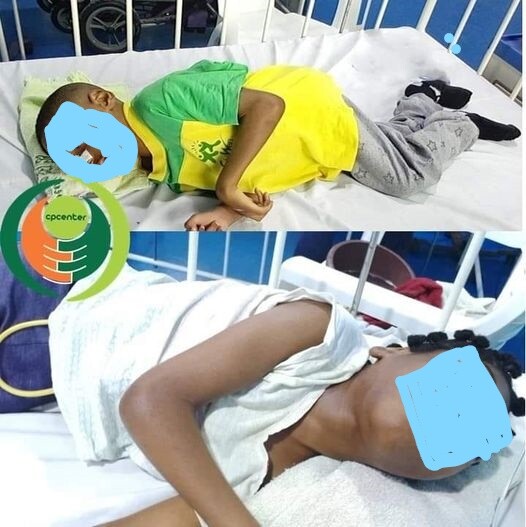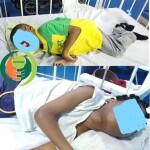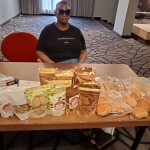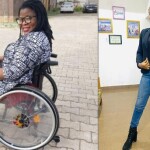Education largely defines Nigerian government support and policies for children with disabilities. Cerebral palsy children caregivers living through it view things from different angles, and conclude.
By Elijah Olusegun
“Could you please quickly tell me what you want? I’m cooking for my children right now.”
Nonye Nweke’s reaction to the first interview appointment for this story early October could have shocked anyone. Except mums like her.
Between then and the time she eventually fixed, about 14 days after, two of her 10 children had gone under the knife at the Lagos University Teaching Hospital, Lagos.
“I was hooked all that time. I couldn’t get myself,” she says.
That is no apology. She’s only relating the reason for the tension in her response to the follow-up requests. It wasn’t the bills racking up that got her strung-up, either. Sections 17 and 21 of Nigeria’s Discrimination Act 2018 makes free education and health services the rights of children like hers. Likewise the Child Rights Act. But the hospital billed her to the last kobo—for tests and other preparations even before the surgery.
This gap—between the Act and the reality of child caregiving in Nigeria—widens when it comes to children with disabilities. It becomes a chasm when the disability is not just cerebral palsy (CP), but the form down the end of the spectrum. Like quadriplegic or hemiplegic or paraplegic CP.
“The blind can still learn with braille. Amputees can move about and learn. I tell people these are not disabilities,” she says. “Even on the CP spectrum, there are some Nigerians with CP. They went to school. They drive.”
To her amazement, these ones get more attention and funding from foreign donors, governments, and corporate bodies. “The donors want to see results,” she says, nodding like a go-ahead entrepreneur she used to be. “Like this building: I completed it in two years while we were at Surulere. People contributing were encouraged seeing the result of the money while we built.” But her children can’t do anything for themselves, let alone guarantee results—unlike those other ones who can learn, go to school, and do other things even with their disabilities. She cites Hellen Keller’s history: her father’s wealth that gave a huge spin to her visual impairment on the spectrum of disabilities. Nonye also drops names of some big noises in Nigeria’s disability community, their preppy schools, marriages to old money, and all the leg-ups they got in life.
“Not everyone with disability gets that.” Her voice carries a firmness that floats on the breeze wafting from a standing fan inside her office. She sits on the CEO side of a desk lacquered kiwi-brown, opposite a wall supporting a flat-screen TV set. All reflects on the floor tiles well-polished. Some distance to her laptop on the table stands a pile of books.
She talks relaxed now at her home. And elsewhere.
“I will tell you. Though no one told me,” she chatted on Facebook late October about gastrostomy tubing in caregiving.
Her last posts on CP Center’s Facebook page were only asking the 5000-member community for good wishes for the surgery. “I have lost children,” she says, kicking back in her seat. “One died on me while I was carrying her to hospital at night.” She had to drive the mother and her dead child in her car down to their place in the middle of the night. Nothing ought to shake her that much again.
While her own were on admission at LUTH, Nonye met a child with a swollen head. The surgery failed. She says it was nobody’s fault: it happens at times that hydrocephalus won’t drain as you expect.
“The boy also has autism.”
Some intellectual disabilities—or any kind of disabilities—get so severe inclusive education or advocacy will never help. Ever. “You can’t tell me all children with autism or Down Syndrome or CP can learn,” she says.
Passion surged between the two mothers in the ward. She interacted with the boy’s mother, and learnt the husband had skipped on them. The boy had a chance if the mother could settle up the bill for the first surgery, and pay for another.
The head remained swollen while they waited.
***
At nine, Testimony, one of Nonye’s two children in for surgery, had what most of the children with severe CP suffer: difficulty eating by themselves. The older they get, she notes, the more their health degenerates, and the more care they need.
“We had to open him up,” she says.
The free health service the government provides for children with disabilities (CWDs) can only cover headaches and the likes. Not a major medical intervention like this.
She follows the free throw she gave the government policy with a moment’s quiet.
Not much has actually stirred in the building. Except some four staffers scurrying up and down two flights of stairs, with a ramp and railings gleaming and running alongside, all the way down into the reception. White lights stuck on the first floor above, along with smoke detectors, shimmer down on the tiled floor. More than 10 windows let in the air Nonye wants—the type that doesn’t need nosegays to filter.
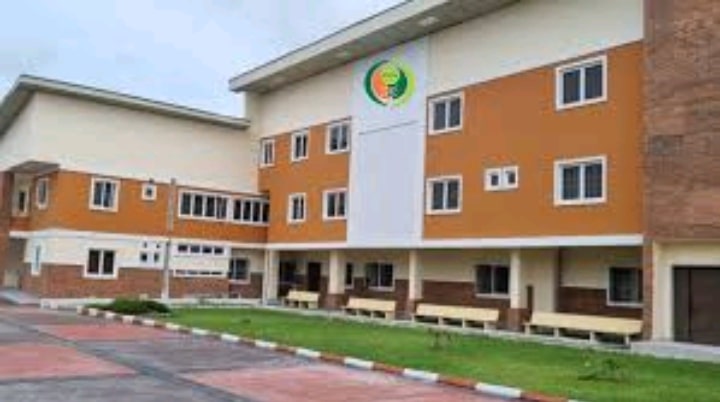
But there's no patter of small feet or shrieks. Only the droning of an inverter powering the building. Such seems the nature of the Cerebral Palsy Center, Lekowan, Lekki, the southeastern part of the Lagos peninsula that defines Africa’s high-end real estate market. The Center’s orange exterior bestows a kind of majesty on the building. With its foreground of cobblestones clean-swept, right from the blind alley that leads there, the building gives off an air of quiet wholesomeness.
“My daughter Zimozu is 17 now. The first day I brought her home in my former place was the only time just one neighbor ever saw her,” she says.
Her daughter is among the 700,000 Nigerian children whom Lesi Afolabi, a professor of pediatrics, said live with cerebral palsy; she is one of the over 200,000 (out-of-school) CWDs a 2020 study by Festus Fajemilo Foundation claimed live in Lagos. Snatches of several studies across Nigeria also confirmed Spastic Quadriplegic CP (that renders victims nonverbal and completely dependent) remains the commonest in Nigeria.
Governments make policies on disabilities; corporate organisations also undertake inclusive social responsibility projects. She never sees them consider these children who can never learn or become anything in life.
But, in the US, Congress is pushing a bill, the CP Research Program Authorization Act, which grants more resources to American children with CP.
“We aren’t there yet,” says Willoughby Babatunde, the first national vice president of the Association for Intellectual and Developmental Disability of Nigeria. He notes, for now, the government can’t even commit to the rights of all CWDs in Lagos. It provides only feeding for its Modupe Cole Memorial Child Care Centre. No provision for drugs, physiotherapy, other health services, and caregivers’ support. This is the only state facility housing children with Down Syndrome, CP, autism, and others.
Only children from 18 upward, who have learnt enough to need no caregivers, can access the free healthcare scheme the state provides the centre, Willoughby, who’s also its PTA chairman, says. The state excludes children who can never learn that much.
Yet the Lagos Special People Law (LSPL), in sections 20 and 21, guarantees the rights to free health for all children with disabilities. The Lagos Office of Disability Affairs didn’t respond to a request for clarification.
“But let no one be deceived,” Nonye says. “A society is not judged by learning; it’s judged by how it helps those who cannot support themselves.”
This judgement matters to her. It has become her driving force: to help somebody on the ledge believe God still exists. “And to help these children feed, live, and enjoy the dignity they deserve as humans.”
That is the result the CP Centre strives for.
***
Living seemed at stake for Testimony while they were at LUTH. “Maybe I didn’t do enough.” She remembers what was going through her mind then. Tears streaked down her cheeks at a point inside the ward.
Back at home, her staff kept working round the clock on the remaining eight children. It isn’t just cleaning up after a child, and changing their diapers. She asked Testimony’s caregiver earlier this morning the colour and consistency of the girl’s poop. They enter the details into the logbooks she stacks on the table corner—for Testimony and every other child that pooped that morning. Zimozu has two caregivers attending to her alone, 24 hours daily. The third relieves the others so nobody burns out.
“When I employ them I let them know what they are in for. And I pay them.” She stresses it, as usual, with a tone that dismisses the attachment many have to money.
Seventeen people work here. She could have taken on more, on principles. There’s no quality or dignity in lumping up CWDs in a crummy place like she says many homes do—to impress donors who like big figures. She limits the number she accommodates to 10. They have a room she equipped for their therapy, and another one for cleaning them, and changing their clothes. The latter butts on the living area furnished with their upholstered seats. Its lighting and painting lures the body into relaxation. On its wall hangs a 55-inch flat-screen TV set, sparkling. A parent who had visited for enquiry learnt about the former clunker, and thereafter did a fundraiser online. Nonye’s car couldn’t accommodate the brand new set the day they bought it. At a corner, their wheelchairs stand, combining definition and cushiness that makes the ride anywhere a swell time. Like when the kids air out, for sunlight, on their well-manicured green that radiates vitality.
“I made this place what you see now so people walking in here envy my children instead of pitying them,” she says.
Rich Lagosians bring their kids, and ask her to name her price. She usually turns them back. “If I had allowed that, most of the kids I took in here would never have had the opportunity.”
None of the Center’s board of trustees, except one, has a child in. The medical expert on the board offered to help unsolicited. Nonye had brought Zimuzo to his hospital, and her passion and education on CP wowed him into supporting the Center; the legal adviser, equally impressed, also offered his services willingly. Likewise other trustees.
She didn’t set up the Center for fund generation or reward. The idea hit 17 years ago, some months after she brought her daughter to Lagos—from the Ministry of Women Affairs and Social Development, Owerri, southeastern Nigeria. She then discovered the baby had CP.
“But babies are not pairs of shoes you can return and exchange if they have defects,” she says.
No crèche or orphanage, including the two which initially accepted, wanted to take in the baby. She just shuttered her fastfood outlet at Surulere, and sent away its 30 staffers. The quest for medical intervention then took both of them to Turkey, Germany, and the UK. She accepted, along the line, she would never return to whom she was before the girl came into her life.
At her low moments Nonye sometimes second-guesses her decision. “If I had known then all I know now, would I have taken her still?”
***
The Center now takes the burden off parents (of kids with CP) who lost jobs, marriages, and other things; they can have time to start afresh. “Disability is the passport to poverty, you know,” she says. She even supports some of the parents. All they have to do is follow up on their children’s progress. And most do. She wonders how that story stuck—the infanticide and abandonment theories the National Human Rights Commission and other CP advocates yarn usually about Nigerian parents.
“It’s a lie.” She shakes her head. “If anyone abandons children, it’s the government.” The ministry sent her a child, and no official has ever followed up. Killing of children might have happened in the past when culture permitted it. But she says awareness is high now. And parents already understand a child having seizures, and walking somehow with a twisted face is not a curse or punishment by the gods. Testimony’s mum was at LUTH—even when fear thumped her chest, and she couldn’t pick up the tabs.
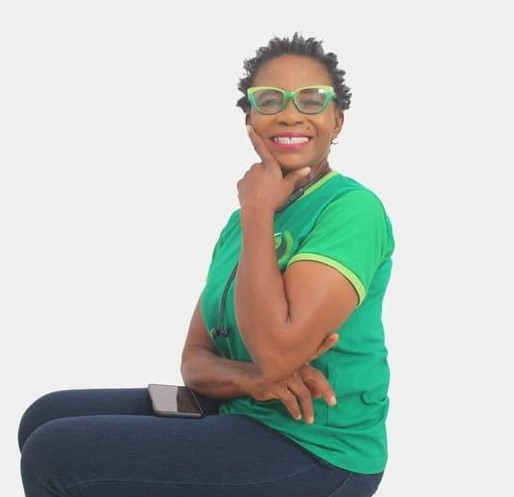
Not that Nonye had the cash stacked somewhere. She just bulled ahead.
And it was a good thing Testimony and the other kid pulled through.
“By the time we were done, our bill was N800,000.00 ,” she says. LUTH would not let them go home without paying up.
She went back to her community, and gave them a head-up. “Pls help us offset their bills,” she posted on October 20. And Nigerians started pitching in—N1000 here and there. “At a point somebody asked me how much was left. I told him, and he sent it.”
Not many parents or care homes can pull that off.
The other woman couldn’t. Her son remained in the ward since doctors abandoned their case. Nonye and her children, too, left them for home. In all this, the federal hospital runs a social service funding from which emergencies like this may draw. Nobody bothered.
But Nonye’s mind didn’t leave the boy.
“The educated ones go abroad and see how societies help people who can’t support themselves. Until they decide to do the same here, no policy will work for CWDs,” she says.
For all she cares, this is no campaign for a new law or an amendment. Advocacy isn’t her strong suit. “The government is still struggling with providing for people with no disabilities. They don’t have time to think properly about children with CP.”
Creating awareness and following it with services makes more sense to her as a pathway.
She swipes her phone buzzing on the table. Testimony’s mum is calling from LUTH. She has yet to locate the mother of the boy Nonye sent her to. The stranded mum sold her phone days back.
Nonye has picked up the bills for the boy’s two operations.
“I had to send somebody to give her the money. I never gave her any hint—not even my phone number. I don’t want people to start thanking me,” she says.
But she believes government support for caregivers, including parents, and the availability of health services will go a long way. The former matters to her a lot—even if just for the future. She and her workers committing their lives to this cause will tire someday.
Not yet, though.
Her October 26 G-tubing Facebook crash course came about after another of her children had the device sprung on him. She learnt this while trying to nab a breather after the LUTH exhaustion. The hole in the boy’s stomach could close up soon. She sprang up, and fixed him a spare one.
No risking the next emergency of this type.
“Does anyone have one or two s/he doesn’t need to send our way?”
Different Strokes
After Jane breathed her last in August, Mummy set her mind on the next big things on her laundry list for the months ahead, including October ending.
Eight more days to go today.
The morning cloud in that part of Lagos skyline is a clear black. She could have risen with the lark, and defied it—to start her begging.
“Shouldn’t I rest—at 72?”
A film of sweat covers the small of her neck. She doesn’t mind.
Outside of her office wall, a gaggle of children teeter up and down, yelling, crackling on the white alluvial sand that stretches down to a swamp on the compound’s perimeter. A 25-foot breach in the fence brings into view a thicket of mangrove ferns, shrubs, and raffia palms.
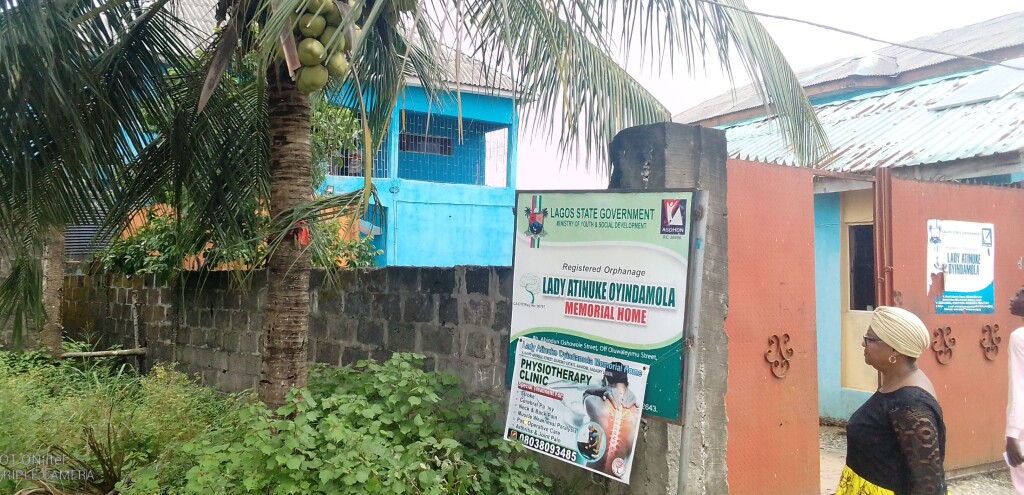
The kids just left her office after greeting their ‘Mummy’ Elsie Akerele. Others remain inside a barn of a story-building some strides away. Its façade screams blue; its interior, somewhat muted, houses all her children, including Gladys, and Binta, a medical doctor’s daughter. Forty-four in all, young and old—all kids who hardly know they were born. Other children from the neighbourhoods join them, too—to play with their friends as usual.
Mummy’s anxiety ratchets up about this time every month.
“I sat up around 3 am today. I was thinking of those I already contacted, and others I am yet to meet,” she says. Some of these people she stings for money don’t know her. She just sends good wishes and prayers to their phones.
“They call back at times.”
It’s about 10. Dusk still drifts around the room, darkening a corner where a table cringes under a desktop computer and a printer. Two portraits of a light-skinned lady hang on the wall. Her late daughter Atinuke’s. She survived epilepsy but fell victim to childbirth medical errors. Her pictures brighten the room a bit. Mummy still retains some of the youth in her own skin, too. The burden lies only on her heart.
The last time things spiralled out of control like it’s about to now, her workers then ‘nearly stole’ her. “The food the children should eat would just disappear,” she says.
If she didn’t raise N800,000 in seven days’ time, her children would have it rough again. Their health, including physiotherapy sessions Paul Egbo conducts twice weekly, and feeding would suffer.
***
Elsie hopped on this rollercoaster about three decades ago when she gave birth to her son. “His sibling called him three-in-one,” she says. Dave demanded her full attention in caring and learning. She had to ground all her businesses and sources of income. Classes at the federal psychiatric hospital in Yaba, reading books on autism, Down syndrome, and cerebral palsy replaced money making.
“Many of those students are now medical directors. They joke I studied without a matric number and certificate.” She adjusts the lower part of her surplus gown, a green Ankara fabric on which she grafted a blouse of some English print.
The commitment and knowledge she gathered became an outreach to other children with intellectual disabilities—and their parents. A Bill and Melinda Gates-sponsored report in LANCET (2018) said Nigeria had 2.7 million such children.
By the time Mummy founded the Lady Atinuke Home in 1995, the figure hadn’t crept up.
“When I took them in, I promised them I’d do my best to love them and care for them. For my conscience’s sake.” And panhandling turns out the only way she can sustain the care—for their medical bills, caregivers’ salaries, and food. The LSPL provides for these. But she dismisses the law. “Poor people have children with CP. How many of those who made the law have one? They can’t know the difference between caring for CP and other disabilities.”
It’s a given—that caregivers spend six times the cost of a regular child’s caregiving on another with disability. She tries to do as much penny-pinching as possible in managing the home. “Still, considering our cheap locality, we spend N160,000 or $160 weekly per child with CP,” she says.
These are hard times for most Nigerians living below $2 daily. She faces a harder test to boot—the test of her commitment and promise she made every of the 17 children with CP, and others in the home.
She has to keep it. Their relationship has come a long way. Some of them she literally snatched from the jaws of death.
“My inner man tells me life alone matters, the same life we share with the children. It makes me do my best to keep them alive,” she says.
Screeching and cruising filtering in punctuates the conversation in her office. Buses stream past a checkpoint customs officers mount close to a bridge on the highway meters away. The dual Badagry expressway bursts through the mangrove forest hedging Lady Atinuke Home’s and other buildings.
On either side of the road mushroom boomtowns interspersed with communities; some fish on the lagoon running a mile off the Atlantic Ocean; there are others, too, cultivating the mangrove forest in the area. The settlements dot the stretch of land all the way to the border towns between Nigeria and the Republic of Benin. Many here believe children like Dave, Jane, and Binta are from the gods. Curses for adultery, theft or abomination their parents commit. And they must return the kids to the gods.
It takes a kind of ceremony on the waters, in a new canoe carrying a pot, lots of food, and the ‘strange’ kid, decked out the local way. The pot becomes the child’s final vessel in which they will return to their Maker.
“I have never witnessed it, she says. “But I learnt that is their belief about children with twisted bodies, saliva pouring from their mouths, and looking somehow. ”
She actually heard one from the horse’s mouth.
“She refused to die,” Mrs. Tobi told her when she brought Gladys to the home.
The mother had given the girl SNIPER three times.
“Mummy, I am tired.”
SNIPER is an insecticide that does visceral damage within minutes of ingestion. Many suicides make its Dichlorovinyl Dimethylphosphate their poison of choice in Nigeria. And the Nigerian disability law criminalizes poisoning a person because of their disabilities.
“The mother told me she was ready for government to jail her—that the girl brought her misfortune—nobody bought what she sold again because of her daughter—that the girl took all her time when there were three other children to take care of.”
Gladys had half of her body paralyzed before she moved in; and she responded to voice stimulation only with grunts—aphasia. That Tobi didn’t walk away after registration made her daughter one of the home’s four children whose parents stay in touch—remotely. The founder realized late that the remaining 40 had been offloaded on her for good. The place was still a boarding facility then. And social distancing during the Covid-19 pandemic required she call the parents to take some of the kids home.
“Only four responded to our tracing.”
She has other kids whose parents dumped somewhere; the police picked up the foundlings, and transferred them to the Juvenile Welfare Centre. From there the state farmed them out to the home. Binta is one of them. Her medical doctor father ditched her.
Of the four parents traceable, only one called most recently—last November. Job-hunting, she says he pleaded, took him to northern Nigeria.
He was alive, at least. She never asked him—or any parents—for money. It’s even the other way round. The home, for instance, set Tobi up in business.
It’s all a sacrifice—from a child who grew up in a family of social workers. And when God ‘engaged’ her with one to care for, she believes she found her calling.
Many things the calling has yanked off her priorities in life. Clothes? Never again. She pinches her gown, and draws it out lightly. Some do-gooders brought it and others for the home. She usually picks hers from the ragbag, and distributes the rest to her children.
A 1995 incident pops up in her memory. The home just started then. It happened some money she kept for new underwear had to be diverted to buying a drug.
“The drug saved the life of a child here. Since then I stopped buying—wearing—underpants.” Her face betrays no emotion.
To keep the kids alive with food and medication, she has done tougher things: loaded bags of rice in the bus (now broken down), and headed to market for a barter.
“We used to have a lot of food donated then. The market people would start calling ‘Mama Badagry!’ ”
From the road walks, seminars, children inclusive parties she organizes, and her brook-no-nonsense demand for attention (most recently for Jane) at the Badagry General Hospital, she’s given CP a whole new meaning in that axis. Among children and adults.
***
Jane got all the medical attention the home could provide for her kidney failure. Mummy had expected they would admit the girl. But the doctors kept them coming daily. Nothing the girl got for free. With all the Discrimination Act provisions, too, the federal psychiatric facility at Oshodi still bills Mummy for other children. Like Binta. The girl is on level two (mild) CP, according to the Gross Motor Function Classification System. Doctors prescribed N36,000 worth of Epilim—10 sachets—as part of the medications Mummy has to buy for her.
“That’s about a worker’s salary. I have 23 here,” she says, welcoming Egbo into her office. “If there is any policy the government can make for children with CP, especially the severe cases, it should be to provide transportation and free health services, especially physiotherapy. And to support caregivers.”
Because the home hasn’t got enough hands, the older females among the children have three younger ones each to take care of every morning. Clean them. Feed them. Fix their diapers, and all that.
Some of these fairy godmothers eventually developed physically and mentally. They learnt craft, left the home, married, and had children. A couple of them even returned to work in the home, and she pays them.
“I tell parents who come asking for formal class what we teach is how to sit up, stand up, feed yourself, and walk. That’s our ‘A for apple’.”
The physiotherapist says the goal is to help the children attain certain milestones: from prone lying to crawling, four-point kneeling, two-point kneeling, standing, standing without support, and walking.
At 13, Gladys, for instance, has hit her own ‘plateau’. No walking aids needed again to move around. Her mother will soon come for her. Egbo confirms the girl even gesticulates now. “We’re working on her balancing and facial muscles to control her drooling.”
All that effort still amounts to a scratch of the whole task. Nothing cheery.
“Thank you for your concern.” Gladys’ mother hisses. “She has improved. It’s just like abandoning her there.”
The dread of looking forward to that one-week holiday tints her overall report on Gladys’ progress. Many of the children will still walk right into a fire if nobody stops them, Mummy herself says.
***
Past a burglar-proof iron bar, a giant wooden door half opened leads to the ground floor of the main building. The door thickness can stave off black swamp mambas and crocodiles (they slither into the compound regularly) long enough for help to come. A 30-inch flat-screen TV, disconnected, hangs on the left wall of the parlour. Its walls suck up the little light let in. The tiled floor, however, sparkles. The children stick around the doors of more than five adjoining rooms. A ping-pong board at a corner has two boys lounging on it.
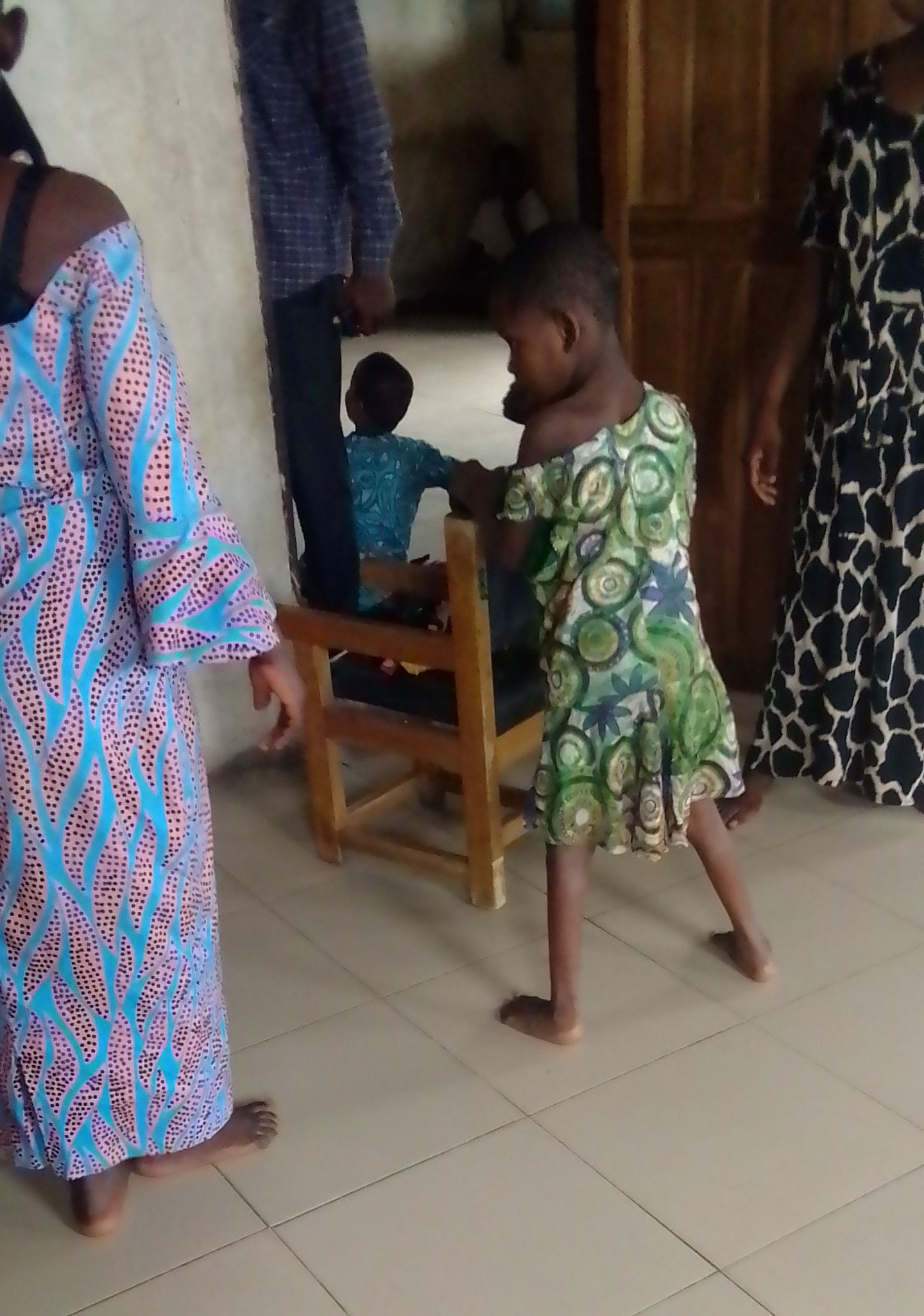
The only access to the first floor is by two flights of ramp. Its surface roughed up with sandstones hugs the sole tight. The bannister’s rusty brown tries to glow in the clammy passage as it runs up to the balcony. The parlour looks like the first one. Except for at least four boys that lie on the floor. Their struggle to speak sends shudders up their bodies. Dave sitting by the corner rises up to snatch a handshake. His spoken English flows—through his nose. Mummy says he started learning to talk at 14.
One of the rooms has girls only. Four of them lie on a mat. Others, including Gladys, either sit up or stand about. Two women attend to Binta. She’s pushing a wooden chair across the room. Egbo and Mummy, in surprise, watch her blunder along. Her CP also affects the part of her brain that controls her vision.
“We could put her up for international adoption if nobody came to ask after her,” Mummy says. No point contemplating Nigerians adopting a girl with CP.
Mummy later goes downstairs. A long-time benefactor earlier promised to show up this week. She’ll keep her own part of the bargain.
She’s always ensured that, no matter what.
The last time they brought Jane home from hospital, Mummy instructed they feed her, clean her, and change her diapers.
And everyone went to sleep that Friday night.
“We know they’ll die. And when it happens—ask my workers—I just walk off.” She snaps her fingers.
“I promised them if they ever die, they’ll die among people who love them.”
Note: Names of the children and their mums changed except for two of three children

